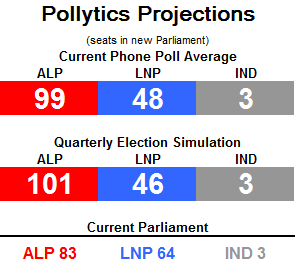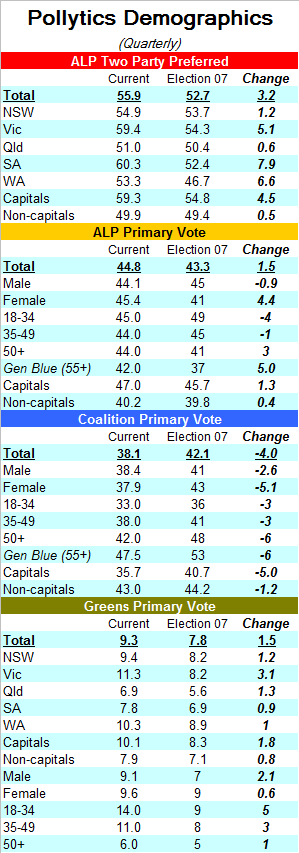What happened on that 24 hour period in Australia had to happen, it’s that simple. I was an admirer of Kevin Rudd during the first two years of his term as PM, however, it was clearly starting to unravel. The placement of the ETS on the back-burner; the awful messaging surrounding the Mining Super Tax; the number of times the Coalition were let of the hook despite some hideous mistakes including Julia Bishop’s horrendous national security passport gaffe; Tony Abbott’s numerous mistakes culminating in his statement on the 730 report that in the heat of the moment, not everything he says can be considered gospel; the complete lack of effective policy from the Coalition. As Gillard stated, this was a good government that had lost its way and the Coalition now will have a brand new, re-energised foe to face.
What the ALP must do is reconnect with the electorate.The public must understand what the Government is fighting for and why. The Government has the ammunition to blunt any of the Coalitions economic arguments and this ammunition should be used constantly. overtime the Opposition mention the debt, the Government should be screaming from the rafters that the ALP got Australia through the second worse economic crisis the world has ever faced. Australia’s forecast of being out of debt in three years has the rest of the world green with envy. Sure, the Government had to spend money to stimulate the economy, but it worked. Sure Australia have briefly gone into debt, but the fact that the economy was handled so well, employment never went as high as was forecast, debt never went as high as forecast, borrowing never went as high as forecast and Australian is in great shape because of the ALP. We will soon be out of debt and far from any The ALP should scream this, often, frequently, until they are horse.
The ETS must be brought back and fought for at the next election, completely blowing away any chance the Coalition will have to block it in the Senate because there will be a clear mandate. The Coalition should be tarnished as the party of no and a party willing to play dangerous games with the nation’s future by putting climate change as an issue of little importance. The Greens have to be attacked as the Party of our way or the highway and as being just as responsible for the blocking of the ETS as the Coalition. This will get the ALP’s environmental credentials back and would mean votes would stop leaking to the Greens.
The Super Mining Tax is a good tax, but it must be communicated in an effective understandable way. It should be framed as the People’s Resources Fund, not a ‘Super’ tax on miners, which is currently how it sounds.It is necessary, it will help our economy and the voters agree that money derived from our resources should stay in Australia. But it needs to be sold properly.
A discussion surrounding a pull-out date for Afghanistan will also help. With casualty numbers up, people are losing faith in the war and Karzai. Obama, Cameron and NATO as a whole are discussing a pull out date, so should we.
Gillard is an excellent choice and will be a brilliant leader of the ALP and the country. She is strong, frank and very Australian. She doesn’t act or sound like the academic that Rudd did, despite being incredibly intelligent and exceptionally politically savvy. Being the first ever woman will naturally be a positive for half of the electorate and I believe the other half will soon catch up.
She has fought Abbot on numerous occasions and has generally won more often than not. She will be able to take the fight back to him, question his odd statements and show him to be the extreme right leader he is. Already, the Coalition are playing a dangerous game by attacking the ALP for having blood on its hands – Abbott is the third Coalition leader in three years – people can do the maths.
If the ALP can get this messaging right, they can regain their popularity and win the next election convincingly. It will be hard and it will be a lot of work, but they can do it.




Communications is the key to political success
10 JanI’ve just finished All that’s left – What Labor should stand for, which is a reasonably interesting read looking at the future of the Australian (and in the process global) Labour momevements. It a philasophical look of where we on the left are, where we’ve come from, and where we have to go to ensure social justive and the future of social democracy. There was some interesting articles in there, but there is a gaping chasm that we on the left we seem never to fill and it is one of my greatest irks.
Where is the section about selling ideas to the public? There is plenty about how the labour movement needs to increase social engagement and that government should be out to help the people, but there is nothing so far as to how to sell it to the public. There is a section on getting trust back into politics, but that isn’t quite the same.
Kevin Rudd made a number of mistakes, some big, some small, but I still believe his biggest one and the err that ultimatly led to his downfall, was the cutting of department communications budgets. When I was looking for a job when I got back to Australia, a public affairs recruitment agent told me that when Rudd got into power departmental communications and marketing positions dried up. This got me thinking, how much did this have to do with his downfall and I figure a lot.
Put it this way. This was a time where a new Government with a relativly progressive agenda wanted to sell in grand new ideas and new ways of doing things. But there was no one to sell it. Communications budgets were cut, so the advertising was left to the Prime Ministers’ office and the cabinet members’ press officers and they couldn’t do it. Not because they weren’t talented enough, but there wasn’t enough time in the day to package it and get it out there. That made it look like they couldn’t engage with the public.
You could also probably guarantee that the communications teams weren’t included in concept planning from day one either. Its important for a comms plan to be included in planning right from day one, so pit falls and wins can be planned out right from the begining.
The CPRS and the Mining Super Profits Tax are two examples where poor comms planning completely blew up in the ALP’s faces. In the case of the CPRS, the Government was trumped by the Opposition having a) not being able to sell the concept to the public b) not being able to forsee the right wing views that took over in the Opposition and c) Abbott had a catchier line with “a great big new tax”, which is devilishly brilliant. The great big new tax is also an example of sometimes the left needs to get down and fight with conservatives in the dirt and throw some mud. That’s where they fight and to match them, we have to do. One person on the the left who did do this succesfully was Alastair Campbell (you know I had to chuck that in somewhere).
But still, despite all of this, the book doesn’t even list communications as an important issue. Reengaging with the community and the public is vital. Sometimes we talk to the public, not talk with and we wonder why they don’t hear us.
Tags: ALP, cprs, labor, labour, mining tax, rudd